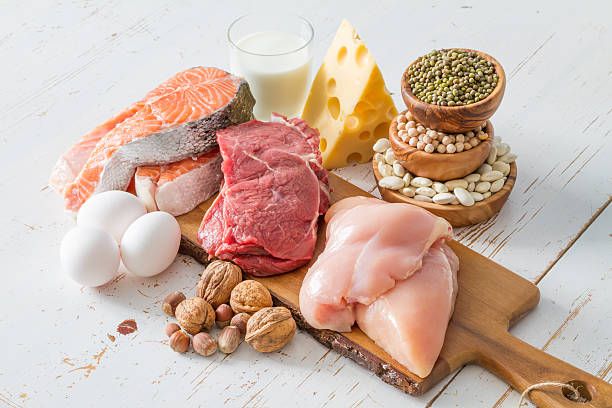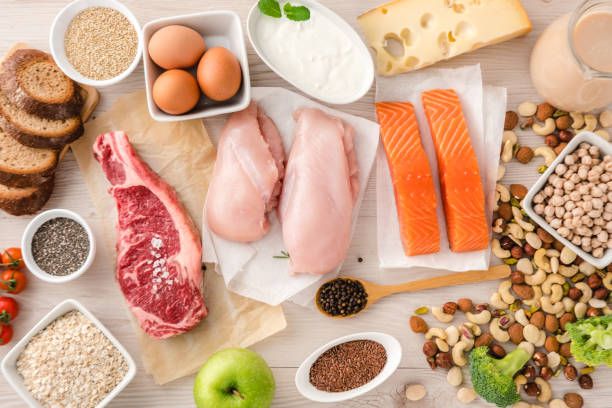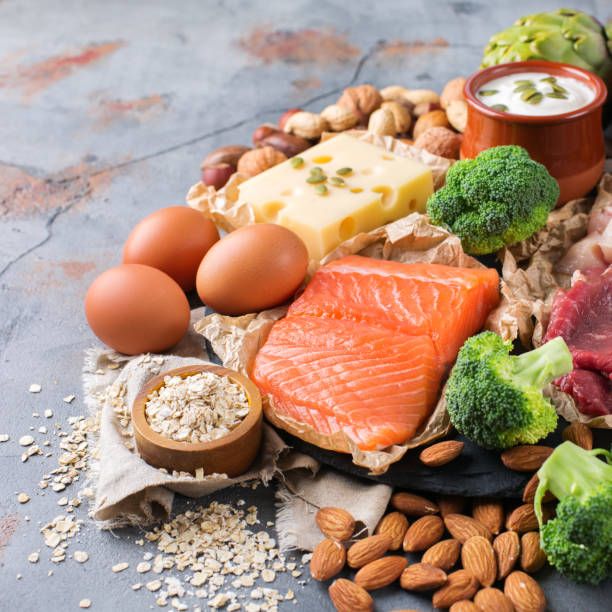Protein Foods – Proteins are crucial for growth, repair, and well-being. In this article, we’ll explore their types, benefits, and cooking methods. Gain valuable insights to make informed dietary choices.
II. Understanding Proteins
Proteins, the workhorses of the body, are made up of amino acids. These molecules are vital for various bodily functions, from forming enzymes that facilitate chemical reactions to building muscles and tissues. Essential amino acids, not produced by the body, must be obtained from our diet. Non-essential amino acids, on the other hand, are naturally synthesized in the body.
Meeting the recommended daily intake of protein is crucial, as it ensures the body functions optimally. Depending on their age, level of physical activity, and overall health condition, individuals may have different nutritional needs and requirements. The ideal protein intake can vary. Understanding these basics sets the foundation for our exploration of protein-rich foods.

III. Types of Protein Foods
A. Animal-Based Proteins
1-Red Meat: Benefits and Potential Drawbacks
Red meat, including beef and lamb, is rich in heme, iron, and vitamin B12. While it provides essential nutrients, excessive consumption may be linked to health issues such as cardiovascular diseases and certain cancers. Moderation is key.
2-Poultry: A Lean Source of Protein
Poultry, like chicken and turkey, offers high-quality protein with lower fat content. It’s versatile, making it a popular choice for various dishes, from salads to soups.
3-Fish and Seafood: Omega-3 Fatty Acids and High-Quality Protein
Fish and seafood are rich in omega-3s, which are essential for heart and brain health. They are also excellent sources of protein, aiding in muscle growth and repair.
4-Dairy Products: Milk, Cheese, and Yogurt as Protein Sources
Dairy products provide calcium and vitamin D along with protein. They are essential for bone health and offer various options, such as milk, cheese, and yogurt, catering to different dietary preferences.
B. Plant-Based Proteins
1-Legumes: Beans, Lentils, and Peas as Excellent Plant-Based Protein Sources
Legumes, including beans, lentils, and peas, are rich in fiber and protein. They are versatile ingredients for salads, stews, and curries, providing a plant-based protein alternative.
2-Nuts and Seeds: Protein-Rich Snacks and Their Nutritional Benefits
3-Tofu and Tempeh: Versatile Protein Options for Vegetarians and Vegans
Tofu and tempeh, derived from soybeans, are popular among vegetarians and vegans. They are excellent sources of plant-based protein, suitable for various culinary applications.
4-Whole Grains: Quinoa, Brown Rice, and Oats as Protein-Rich Grains
Whole grains like quinoa, brown rice, and oats contain significant protein content. They are not only filling but also provide essential nutrients, making them excellent choices for a balanced diet.

IV. Protein and Health
Proteins maintain and repair body tissues, assist in muscle building, promote fullness, aid in weight management, and support bone health by absorbing calcium.
Moreover, proteins boost the immune system, aiding the production of antibodies that defend the body against infections. Their role in immune function highlights their significance in overall health and wellness.
V. Protein Deficiency and Surplus
A. Signs and Symptoms of Protein Deficiency
Protein deficiency can manifest in various ways, including muscle weakness, fatigue, and slow wound healing. Recognizing these signs is crucial to addressing the deficit timely.
B. The Dangers of Excess Protein Intake: Kidney Health and Other Concerns
Consuming excessive protein can strain the kidneys, potentially leading to kidney stones or kidney damage. It’s essential to maintain a balanced protein intake to avoid such health issues.
C. Finding the Right Balance: Tips for Optimal Protein Consumption
Balancing protein intake involves understanding individual needs, choosing a variety of protein sources, and monitoring portion sizes. Consulting a nutritionist can provide personalized guidance for optimal protein consumption.

VI. Cooking and Incorporating Protein Foods
A. Healthy Cooking Methods for Animal-Based Proteins
Opting for grilling, baking, or steaming instead of frying preserves the nutritional value of animal-based proteins. These methods enhance flavors without adding excessive calories.
B. Creative Recipes Using Plant-Based Proteins
Plant-based proteins can be incorporated into diverse recipes, from veggie burgers made with lentils to tofu stir-fries. Experimenting with spices and herbs enhances their taste, making plant-based meals delicious and satisfying.
C. Tips for Meal Planning to Ensure Sufficient Protein Intake
Planning balanced meals with a mix of proteins, carbohydrates, and vegetables ensures a well-rounded diet. Including protein-rich snacks, such as yogurt or nuts, between meals maintains energy levels throughout the day.
VII. Special Diets and Protein Alternatives
A. Protein-Rich Foods for Vegetarians and Vegans
Vegetarians and vegans can rely on a combination of legumes, tofu, tempeh, and nuts to meet their protein needs. Incorporating fortified foods like plant-based milk and cereals enhances protein intake.
B. Protein Supplements: When Are They Necessary?
For athletes with increased protein needs, protein powders and shakes are a convenient option. It is essential to consult with a healthcare professional before adding any supplements to your diet.
C. Protein Options for Individuals with Food Allergies or Intolerances
For those with allergies or intolerances, alternative protein sources like quinoa, seeds, and specific legumes provide safe options. Reading food labels and exploring allergen-free recipes ensures a balanced diet.

VIII. Mastering Protein Intake: A Guide to Nutritional Balance
In mastering your protein intake, you empower yourself to make health-conscious choices. By understanding the diverse sources of proteins, their health benefits, and appropriate cooking methods, you pave the way for a balanced and nutritious lifestyle.
IX. FAQ About Protein Foods
Q1: Can I get enough protein from a vegetarian diet?
A1: Yes, a well-planned vegetarian diet can provide all the essential amino acids and meet your protein needs. Legumes, tofu, tempeh, nuts, and whole grains are excellent sources of plant-based proteins.
Q2: How can I tell if I am getting enough protein in my diet?
A2: Pay attention to your energy levels, muscle strength, and overall health. If you experience constant fatigue or muscle weakness, you should assess and increase your protein intake.
Q3: Are protein supplements necessary for building muscle?
A3: While whole foods are the best source of nutrients, protein supplements can be convenient for individuals with higher protein requirements, like bodybuilders. Consult a fitness expert or nutritionist for personalized advice.
Q4: What are some quick and easy protein-rich snacks for busy days?
A4: Yogurt with nuts, hummus with whole-grain crackers, and protein bars made with natural ingredients are convenient and nutritious snacks to boost your protein intake on busy days.
Q5: Can children and teenagers follow a protein-rich diet safely?
A5: Growing children and teenagers require protein-rich foods for proper growth, development, and immune function. Please encourage them to consume a variety of protein sources like lean meats, fish, dairy, legumes, and whole grains.
Q6: Is it possible to consume too much protein, even if you’re physically active?
A6: Excess protein intake, especially from animal sources, can harm your kidneys and lead to health issues despite its importance for muscle repair. Consult a nutritionist to strike a balance and determine your protein needs based on your activity level and health.
Q7: Can plant-based proteins provide all the essential amino acids the body needs?
A7: Yes, many plant-based proteins can provide all the essential amino acids when consumed in a balanced diet. While individual plant foods might lack some essential amino acids, combining different sources, such as beans and rice, or eating a variety of plant-based foods throughout the day ensures you get all the necessary amino acids. This approach is critical for vegetarians and vegans to ensure they meet their protein and amino acid requirements effectively.
Read also .. The Ultimate Guide to Swimming

